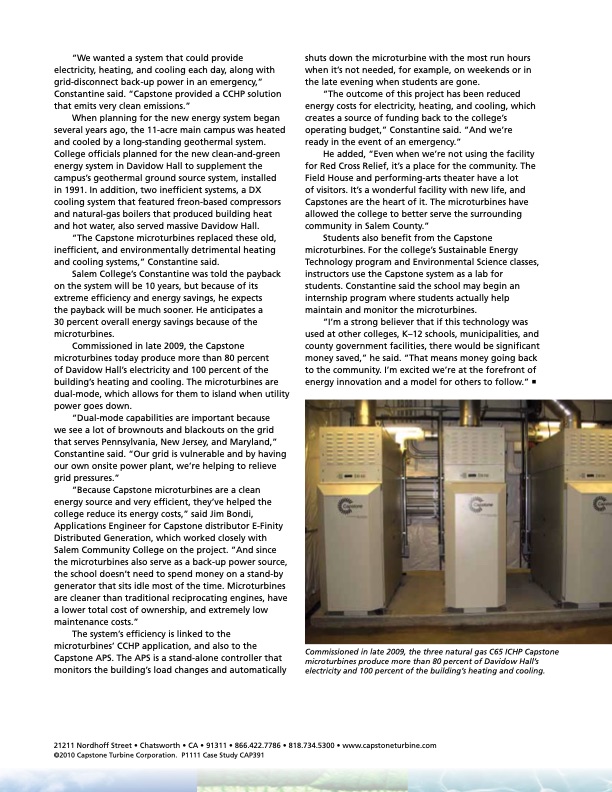
PDF Publication Title:
Text from PDF Page: 002
“We wanted a system that could provide electricity, heating, and cooling each day, along with grid-disconnect back-up power in an emergency,” Constantine said. “Capstone provided a CCHP solution that emits very clean emissions.” When planning for the new energy system began several years ago, the 11-acre main campus was heated and cooled by a long-standing geothermal system. College officials planned for the new clean-and-green energy system in Davidow Hall to supplement the campus’s geothermal ground source system, installed in 1991. In addition, two inefficient systems, a DX cooling system that featured freon-based compressors and natural-gas boilers that produced building heat and hot water, also served massive Davidow Hall. “The Capstone microturbines replaced these old, inefficient, and environmentally detrimental heating and cooling systems,” Constantine said. Salem College’s Constantine was told the payback on the system will be 10 years, but because of its extreme efficiency and energy savings, he expects the payback will be much sooner. He anticipates a 30 percent overall energy savings because of the microturbines. Commissioned in late 2009, the Capstone microturbines today produce more than 80 percent of Davidow Hall’s electricity and 100 percent of the building’s heating and cooling. The microturbines are dual-mode, which allows for them to island when utility power goes down. “Dual-mode capabilities are important because we see a lot of brownouts and blackouts on the grid that serves Pennsylvania, New Jersey, and Maryland,” Constantine said. “Our grid is vulnerable and by having our own onsite power plant, we’re helping to relieve grid pressures.” “Because Capstone microturbines are a clean energy source and very efficient, they’ve helped the college reduce its energy costs,” said Jim Bondi, Applications Engineer for Capstone distributor E-Finity Distributed Generation, which worked closely with Salem Community College on the project. “And since the microturbines also serve as a back-up power source, the school doesn’t need to spend money on a stand-by generator that sits idle most of the time. Microturbines are cleaner than traditional reciprocating engines, have a lower total cost of ownership, and extremely low maintenance costs.” The system’s efficiency is linked to the microturbines’ CCHP application, and also to the Capstone APS. The APS is a stand-alone controller that monitors the building’s load changes and automatically shuts down the microturbine with the most run hours when it’s not needed, for example, on weekends or in the late evening when students are gone. “The outcome of this project has been reduced energy costs for electricity, heating, and cooling, which creates a source of funding back to the college’s operating budget,” Constantine said. “And we’re ready in the event of an emergency.” He added, “Even when we’re not using the facility for Red Cross Relief, it’s a place for the community. The Field House and performing-arts theater have a lot of visitors. It’s a wonderful facility with new life, and Capstones are the heart of it. The microturbines have allowed the college to better serve the surrounding community in Salem County.” Students also benefit from the Capstone microturbines. For the college’s Sustainable Energy Technology program and Environmental Science classes, instructors use the Capstone system as a lab for students. Constantine said the school may begin an internship program where students actually help maintain and monitor the microturbines. “I’m a strong believer that if this technology was used at other colleges, K–12 schools, municipalities, and county government facilities, there would be significant money saved,” he said. “That means money going back to the community. I’m excited we’re at the forefront of energy innovation and a model for others to follow.” Commissioned in late 2009, the three natural gas C65 ICHP Capstone microturbines produce more than 80 percent of Davidow Hall’s electricity and 100 percent of the building’s heating and cooling. 21211 Nordhoff Street • Chatsworth • CA • 91311 • 866.422.7786 • 818.734.5300 • www.capstoneturbine.com ©2010 Capstone Turbine Corporation. P1111 Case Study CAP391PDF Image | Education Salem Community College

PDF Search Title:
Education Salem Community CollegeOriginal File Name Searched:
CS_CAP391_SalemCC_lowres.pdfDIY PDF Search: Google It | Yahoo | Bing
Capstone Turbine and Microturbine: Capstone microturbines used and new surplus for sale listing More Info
Consulting and Strategy Services: Need help with Capstone Turbine, sizing systems, applications, or renewable energy strategy, we are here to assist More Info
Container Lumber Dry Kiln: Since 1991 developing and innovating dry kilns using standard shipping containers More Info
Supercritical CO2 Lumber Dry Kiln: Compact fast drying in 3 days or less for small amounts of wood and lumber drying More Info
BitCoin Mining: Bitcoin Mining and Cryptocurrency... More Info
Publications: Capstone Turbine publications for microturbine and distributed energy More Info
FileMaker Software for Renewable Energy Developing database software for the renewable energy industry More Info
CO2 Gas to Liquids On-Demand Production Cart Developing a supercritical CO2 to alcohol on-demand production system (via Nafion reverse fuel cell) More Info
Stranded Gas for low cost power Bitcoin Mining Using stranded gas for generators may provide breakthrough low power costs for cryptocurrency miners. More Info
| CONTACT TEL: 608-238-6001 Email: greg@globalmicroturbine.com | RSS | AMP |